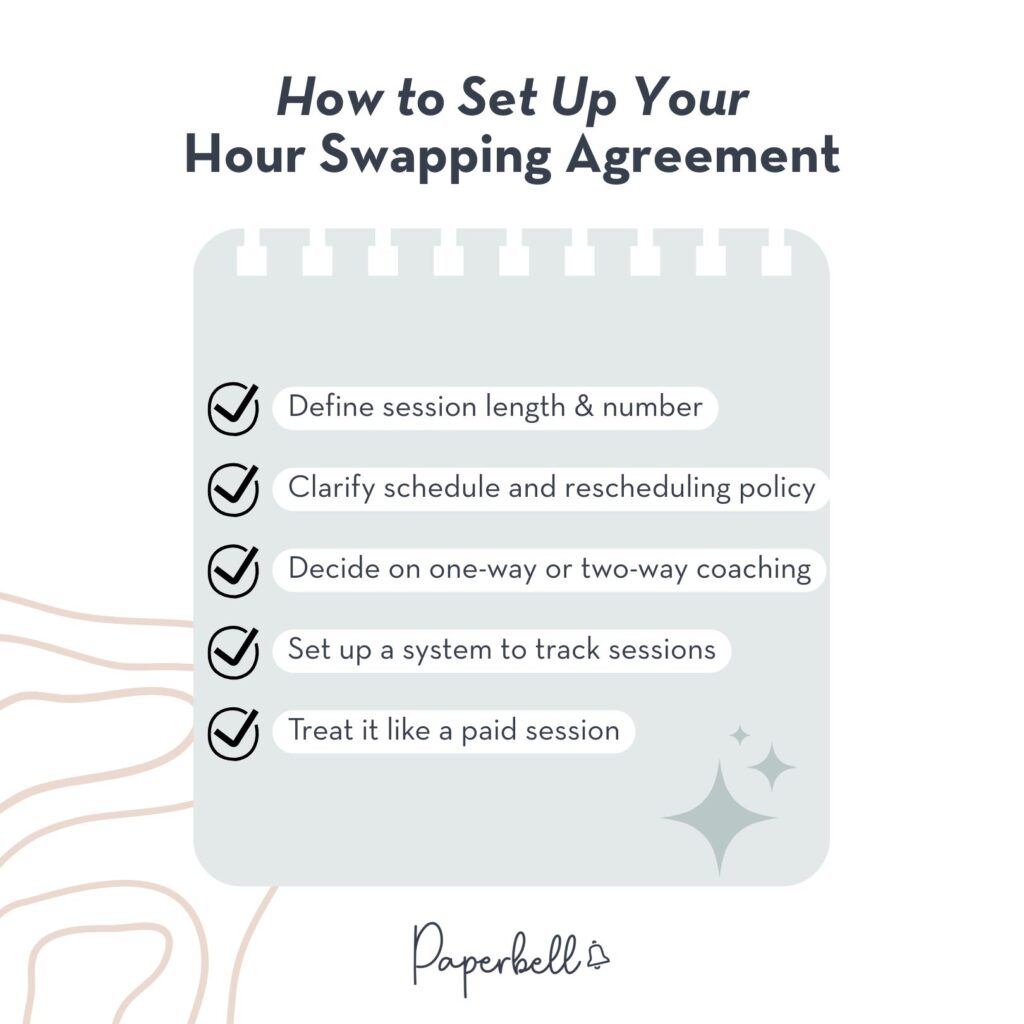One of the biggest challenges when working towards a certification as a new coach is getting your required coaching hours.
Swapping coaching hours with other trainees is a practical way to build experience and meet those requirements. In this guide, we’ll cover what counts as coaching hours, how to ethically swap hours with fellow coaches, and best practices for documenting everything.
What Counts as Coaching Hours?
Not every conversation is a coaching session. Here’s how to collect hours that actually count.
ICF-Approved Coaching Activities
The International Coaching Federation (ICF), which is the gold standard for coaching credentials, has clear rules on what qualifies as a valid coaching hour.
- The session must be actual coaching (not consulting, advising, or teaching).
- Coaching fellow students or trainers in your training program doesn’t count unless it’s outside the training site and they are a paying client.
- You must demonstrate core coaching competencies such as active listening, powerful questioning, goal setting, and accountability.
- The client (or peer) must be willing and aware that they are being coached because passive conversations don’t count.
- All coaching sessions must be real-time interactions, such as in-person meetings, phone calls, and video calls.
Documentation Requirements
ICF certification requires you to maintain a coaching log with details for every session:
- Client name (or initials for confidentiality)
- Contact information
- Date of session
- Length in minutes
- Was it paid, barter or pro bono (volunteer work)
- Format (phone, Zoom, in-person)
- Type (individual or group)
This log will be part of your certification application and may be audited, so accuracy and consistency matter.
Hours That Don’t Count Toward Certification
Not all “helping” conversations qualify as coaching. Hours that won’t be accepted include:
- Therapy, consulting, or mentorships
- Coaching as part of your training course
- Practice coaching hours where the client didn’t know they were being coached
- Conversations with friends or family where you didn’t apply coaching principles.
- Asynchronous communication (like emails or text coaching)
Quality vs. Quantity
According to the ICF coaching requirements, you need to accumulate a certain number of hours for the certification you want.
- 100 coaching hours for an associate certified coach (ACC)
- 500 coaching hours for a professional certified coach (PCC)
- 2,500 coaching hours for a master certified coach (MCC)
But it’s not just about logging time. If you only coach on surface-level topics or don’t practice core coaching competencies, you won’t grow as a coach and may struggle during assessment. So, prioritize the quality of hours logged over the quantity.
What is Hour Swapping?
Now that we know what counts, let’s talk about hour swapping.
Hour swapping in coaching is when two coaches agree to coach each other for the purpose of practicing coaching and logging hours for certification.
If you’re just starting out and haven’t built a steady stream of clients yet, it can be hard to get the required hours to be certified. But hour swapping makes this easy.
Benefits of Hour Swapping
There are several reasons why swapping hours works so well for new coaches.
- Mutual gain: Each coach takes turns in the coach and client seat, and both parties benefit by gaining experience, logging hours, and getting coached.
- Safe space: It’s easier to practice new techniques or ask for feedback when the client is also a peer who is on the same growth journey as you.
- Credentialing advantage: The coaching hours spent during hour swap count as “paid” under ICF standards because you’re exchanging value, and are thus receiving direct payment for your services.
Setting Up Successful Swapping Arrangements
Here’s how to set yourself (and your swap partner) up for success:
- Agree on start and end dates, frequency, session length, and availability.
- Use a coaching scheduler like Paperbell or even Google Calendar invites to formalize everything.
- Clarify coaching objectives to help each person get value as a client and a coach.
- Treat swaps like you’d treat sessions with paying clients.
Ethical Considerations and Boundaries
As a beginner coach looking to swap hours, here are some coaching ethics to consider:
- Don’t treat the session casually just because you’re coaching or receiving coaching from a peer.
- Keep boundaries clear. You’re not business partners, friends, or mentors during the session.
- Honor confidentiality even if you’re in the same coaching community.
How to Find Coaching Hour Swap Partners
The coaching world is full of communities where peers are looking for this same thing. You just need to know where to look.
- Coaching Communities and Forums: Search for communities (such as subreddits, Quora spaces, and Slack channels) related to your program or niche. You will find dedicated threads or put out a request for a swap.
- Social Media Groups: Facebook and other platforms are filled with coaching groups where people actively seek partners. You can put up a short intro with what you’re looking for and your availability.
- Local Coaching Meetups: While virtual swaps are easy, in-person meetups can create long-term partnerships. Check Meetup.com, Eventbrite, or your city’s ICF chapter for events.
Certification Program Networks
Most coaching courses and schools offer student directories, Slack groups, or cohort message boards for collaboration and community support.
Setting Up Your Hour Swapping Agreement

Here are the best tips to set up a smooth hour-swapping coaching agreement:
What to Include in Your Agreement
- How many sessions you’ll do (e.g., 4 weekly sessions)
- How long each session will be (typically 45–60 minutes)
- What happens if someone needs to reschedule
- Whether the swap will be one-way or two-way
Then, put it in writing, even if it’s just in an email, so both parties are aligned.
Scheduling and Logistics
To avoid the back and forth during coaching, you need a scheduling tool for streamlined bookings and reminders, and a CRM tool to manage communications.
Feedback and Improvement
After the session, you can optionally debrief and take note of the following:
- What worked well
- What could improve
- If the coach demonstrated core coaching competence
Using Paperbell to Track Everything
As a new coach starting out, it can be overwhelming managing different tools while juggling coaching requirements and getting new clients.
But Paperbell is an all-in-one coaching software that makes it easy to run and scale your coaching business.

It allows you to:
- Schedule coaching sessions
- Automate reminders
- Create session notes
- Track coaching hours
- Build a no-code business website
- Manage client files and communication
- Receive payments from clients
Tracking and Documenting Your Coaching Hours
Here are the things you need to log and document every hour properly.
Record-Keeping Best Practices
You can create a manual coaching log spreadsheet or save yourself the stress and use Paperbell to note the following:
- Session date
- Client name
- Contact info
- Duration
- Paid, pro bono, or barter
- Notes
What Information to Capture
When applying for a certification, you’ll submit:
- A coaching log with hours categorized by paid/pro bono services
- Client contact info (you can use initials and provide details upon request)
- A summary of your coaching experience
Digital Tools to Help You Stay Organized
To stay organized and track your hours, you can use digital tools like Google Sheets, Notion, or Paperbell.
You can also use coaching templates like the ICF Coaching Log Templates.
FAQs About Swapping Coaching Hours
What counts as coaching hours?
Coaching hours that count must be real-time, intentional sessions where both people agree to the coaching relationship.
How to build your coaching hours?
Land paying coaching clients, do pro-bono work, and swap coaching hours with peers.
Is hour swapping allowed by coaching certification bodies?
Yes, ICF allows barter-based coaching hours as long as the exchange has clear value (e.g., coaching for coaching) and the hours logged meet their standards.
How many hours do I need for ICF certification?
The required coaching certification hours vary. For ACC, it’s 100 coaching hours (75 paid). For PCC, it’s 500 hours (with 450 paid hours). And for MCC, it’s 2500 (2250 paid). With hour swapping, you can hit the paid threshold if it’s a legitimate barter.
Building Your Coaching Business & Credentials
Swapping coaching hours is a convenient way to meet your certification hours requirements while building hands-on experience along the way.
And Paperbell is the coaching software tool you need to log your sessions, simplify administrative tasks, and scale your coaching business without stress. Try Paperbell for free.










